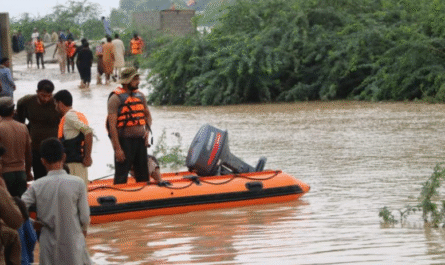When natural disasters strike, communication becomes one of the most critical lifelines. In the wake of the devastating floods that have recently hit parts of Khyber Pakhtunkhwa (KP), Pakistan’s leading telecom operator Jazz has stepped in to support affected communities. The company has announced that it will extend free calls to all networks in the flood-hit regions, ensuring that families can stay connected during this time of crisis.
This move is not just a corporate gesture but also a vital humanitarian measure, highlighting how technology and telecom services play a key role in disaster relief.
Floods in KP: A Humanitarian Crisis
Heavy monsoon rains have triggered flash floods across Khyber Pakhtunkhwa, washing away homes, roads, and farmlands. Thousands of people have been displaced, with many losing access to basic necessities such as clean water, shelter, and electricity.
In such dire circumstances, communication is often the only bridge between survivors, their loved ones, and emergency response teams. Unfortunately, natural disasters often cut off traditional lines of contact, making it harder for affected families to seek help or reassure relatives outside the disaster zone.
That’s where Jazz’s initiative comes into play, offering a much-needed solution in an otherwise chaotic situation.
Jazz’s Relief Initiative: Free Calls to All Networks
Jazz has announced that residents in the flood-hit areas of KP will be able to make free voice calls to all telecom networks, not just Jazz-to-Jazz. This is significant because:
- Families won’t be limited by network restrictions when reaching out to loved ones.
- Relief workers and volunteers can coordinate seamlessly, regardless of their SIM provider.
- Affected communities won’t have to worry about running out of mobile balance in an emergency.
By removing both financial and technical barriers, Jazz is ensuring that connectivity remains uninterrupted — a crucial service during natural disasters.
Why Connectivity Matters in Disasters
The importance of communication in a disaster scenario cannot be overstated. Mobile phones often become the only reliable tool for:
- Emergency coordination: People can alert authorities about trapped individuals or urgent needs.
- Reuniting families: Survivors can quickly inform relatives of their safety.
- Accessing relief services: Citizens can call helplines, NGOs, and government departments for assistance.
- Information flow: Accurate updates about weather conditions, road closures, and safe zones can be shared rapidly.
Without access to calls, many victims risk isolation, adding to their trauma and reducing their chances of receiving timely help. Jazz’s free call initiative directly addresses this issue, ensuring that people remain connected when they need it most.
Jazz’s Track Record in Social Responsibility
This isn’t the first time Jazz has stepped up in moments of crisis. Over the years, the company has earned a reputation for its corporate social responsibility (CSR) initiatives, particularly in disaster management and humanitarian relief.
- During the 2022 nationwide floods, Jazz worked with relief organizations to provide connectivity, emergency aid, and donations for flood victims.
- The company frequently partners with NGOs and the government to launch SMS-based donation campaigns, allowing customers to contribute directly to relief funds.
- Jazz also runs sustainability programs in education, health, and digital inclusion, aiming to bridge the gap between communities and technology.
This consistent pattern reflects the company’s philosophy that connectivity is more than a business — it is a social responsibility.
Technology as a Humanitarian Tool
Jazz’s move also highlights a broader global lesson: technology companies are uniquely positioned to support humanitarian efforts. In times of disaster, governments alone cannot respond effectively; they need private-sector partners who can mobilize resources quickly.
Telecom operators, in particular, hold the power to:
- Restore or maintain communications in disaster-hit areas.
- Waive service fees to ensure access.
- Provide data and call packages to facilitate relief work.
- Collaborate with aid organizations for rapid response.
In the case of the KP floods, Jazz’s free calls are more than a corporate gesture — they are a life-saving measure that helps people remain connected, hopeful, and informed.
Public Response and Impact
The announcement has been met with widespread appreciation across social media platforms. Flood victims, journalists, and humanitarian workers have praised Jazz for recognizing the urgent need for accessible communication.
For families stranded in remote areas, this initiative has already made a difference. Many have used the free call service to contact rescue authorities, reach out to relatives for shelter, and coordinate relief supplies.
The initiative also reduces the financial burden on flood victims, many of whom have lost their livelihoods and possessions to the disaster. Even a small expense like mobile balance can be difficult to manage in such times, and Jazz’s decision to waive charges has eased that burden.
Looking Ahead: The Role of Other Operators
While Jazz has taken the lead, this moment also raises an important question: Should all telecom operators follow suit? In a disaster as severe as the KP floods, coordinated action from the entire telecom sector would amplify the impact, ensuring that every single resident, regardless of their SIM card, enjoys uninterrupted communication.
Moreover, beyond telecom, banks, fintech companies, and tech platforms can also play a role by enabling digital donations, providing emergency financial relief, and offering location-based services to identify and assist those in need.
Conclusion: A Lifeline in Times of Crisis
The KP floods have once again reminded Pakistan of its vulnerability to natural disasters and the urgent need for disaster preparedness. Amidst this tragedy, Jazz’s initiative to offer free calls to all networks stands out as a shining example of how corporations can leverage their resources for humanitarian good.
Connectivity may seem like a small comfort, but for victims struggling to survive, it can mean the difference between despair and hope, between isolation and reunion, between danger and rescue.



